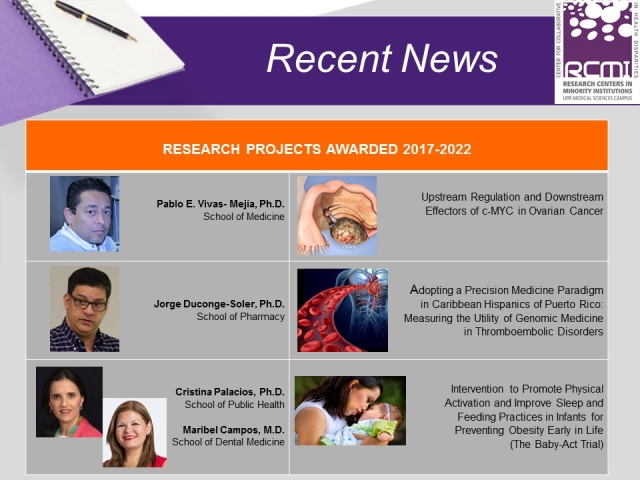Puerto Rico receives federal grant to support research on health disparities
Submitted on 18 October 2017 - 3:11pm
This article is reproduced by CienciaPR with permission from the original source.
CienciaPR Contribution:
Original Source:
By:

The National Institute on Minority Health and Health Disparities, part of the National Institutes of Health, has awarded $19 million for the next five years to the University of Puerto Rico Medical Sci-ences Campus to continue facilitating the development of competitive research being conducted by the Center for Collaborative Research in Minority Health and Health Disparities. The Center will sup-port translational research projects in basic biomedical, behavioral, and clinical research and will implement innovative approaches to promoting minority health and health disparities research among early career investigators and students. These research projects will enhance participation of Hispanic patients in genomics studies, and provide novel interventions to reduce childhood obe-sity within and outside Puerto Rico.
Dr. Emma Fernández-Repollet, Professor of Pharmacology and Principal Investigator of the Center stated that “For the next five years we want to contribute to the national infrastructure and the capacity for research in the health sciences by supporting translational studies in health disparities affecting the Puerto Rican population”. Toward this end, the Center will provide services to facili-tate the conduct of research studies in cancer, cardiovascular diseases and childhood obesity, all health disparities relevant to the Puerto Rican population, as well as sponsor activities to engage communities in research activities and to promote the professional development of early stage in-vestigators.
Specialized services will be provided in the areas of bioinformatics, proteomics, genomics, tropical and infectious diseases, neurogenetics, and bioimaging. Professional development will be ap-proached through a series of activities including a personalized mentoring program designed to foster successful research careers and technology transfer. This will be complemented by a pilot project program which will provide small grants to junior investigators interested in conducting basic and translational studies in conditions that disproportionately affect the Puerto Rican popula-tion. A variety of community-engagement strategies will be designed to increase the number of community-academic collaborations and partnerships, disseminate research findings to a broader audience, enhance the recruitment and retention of study participants, and ultimately reduce health disparities in Puerto Rico.
Sixteen biomedical investigators and twenty-six technical and professional staff will participate in the new award. Over thirty biomedical projects will be impacted during the next five years (2017-2022).







